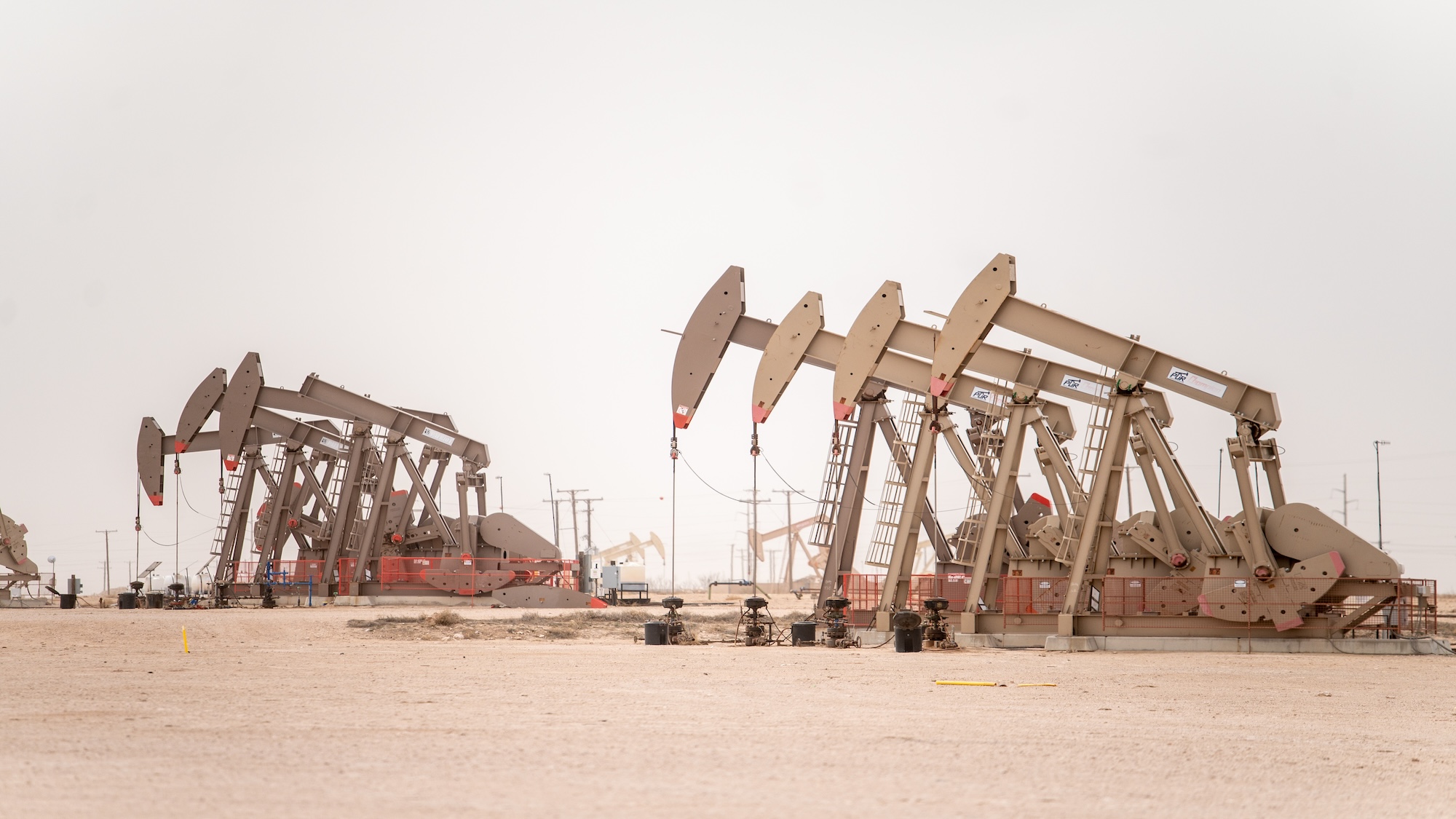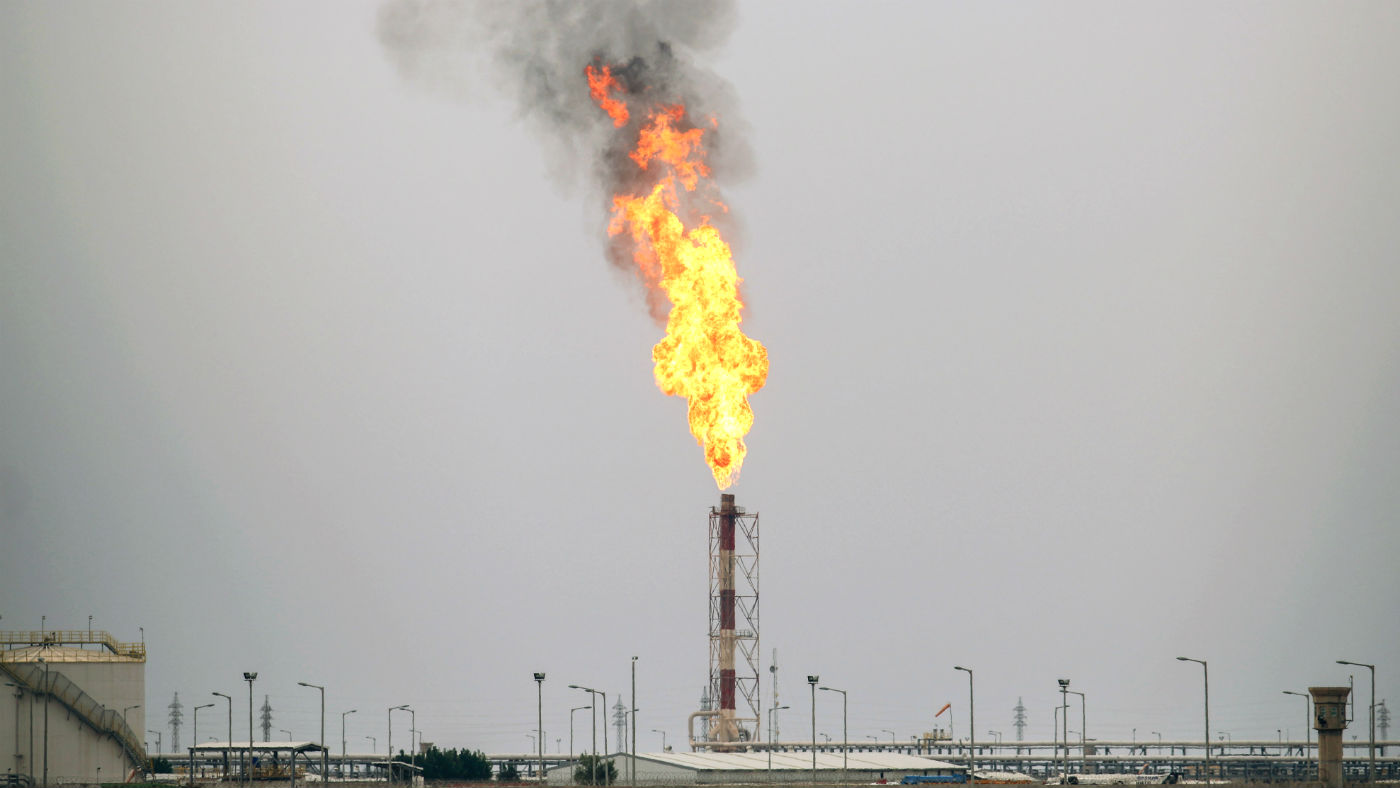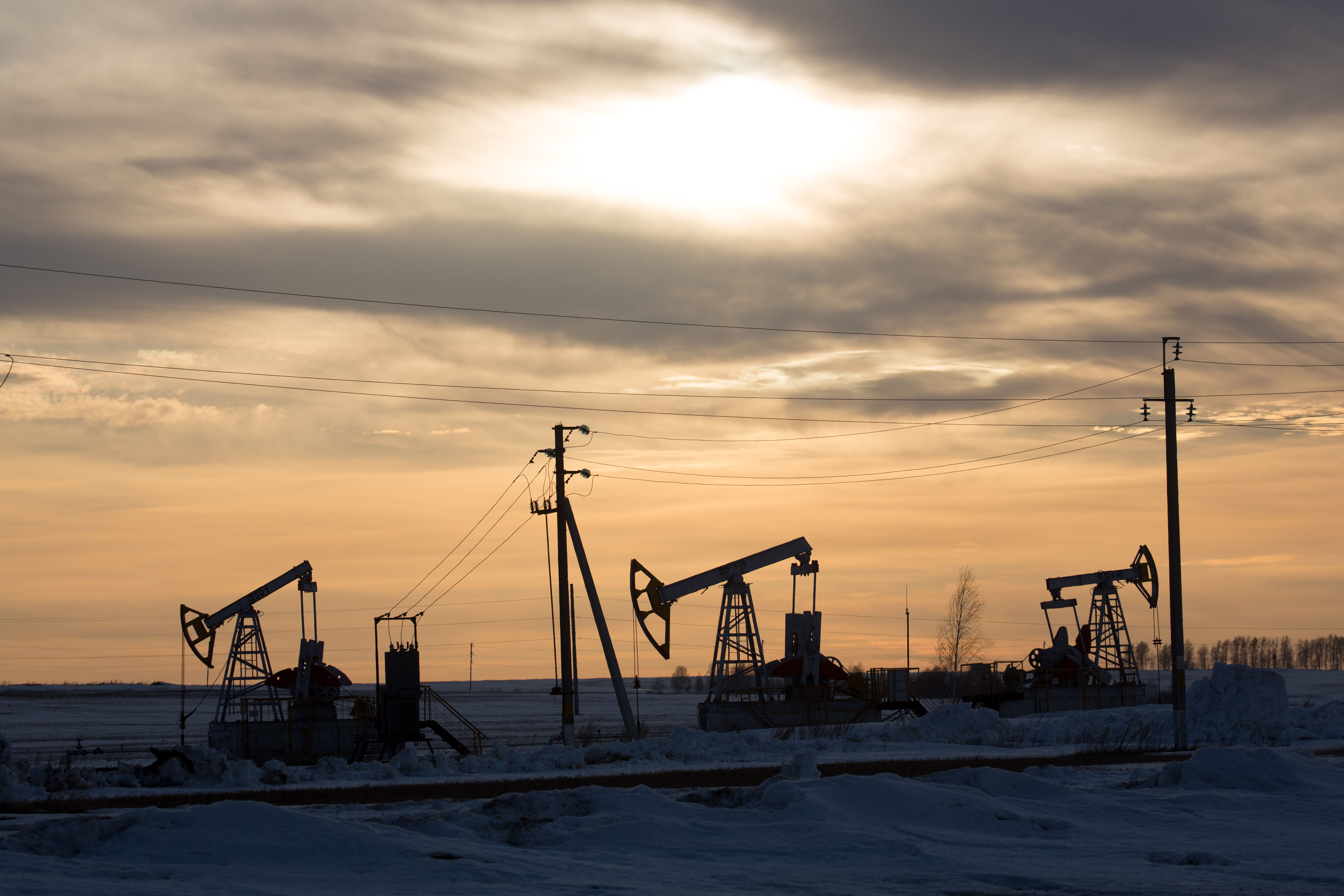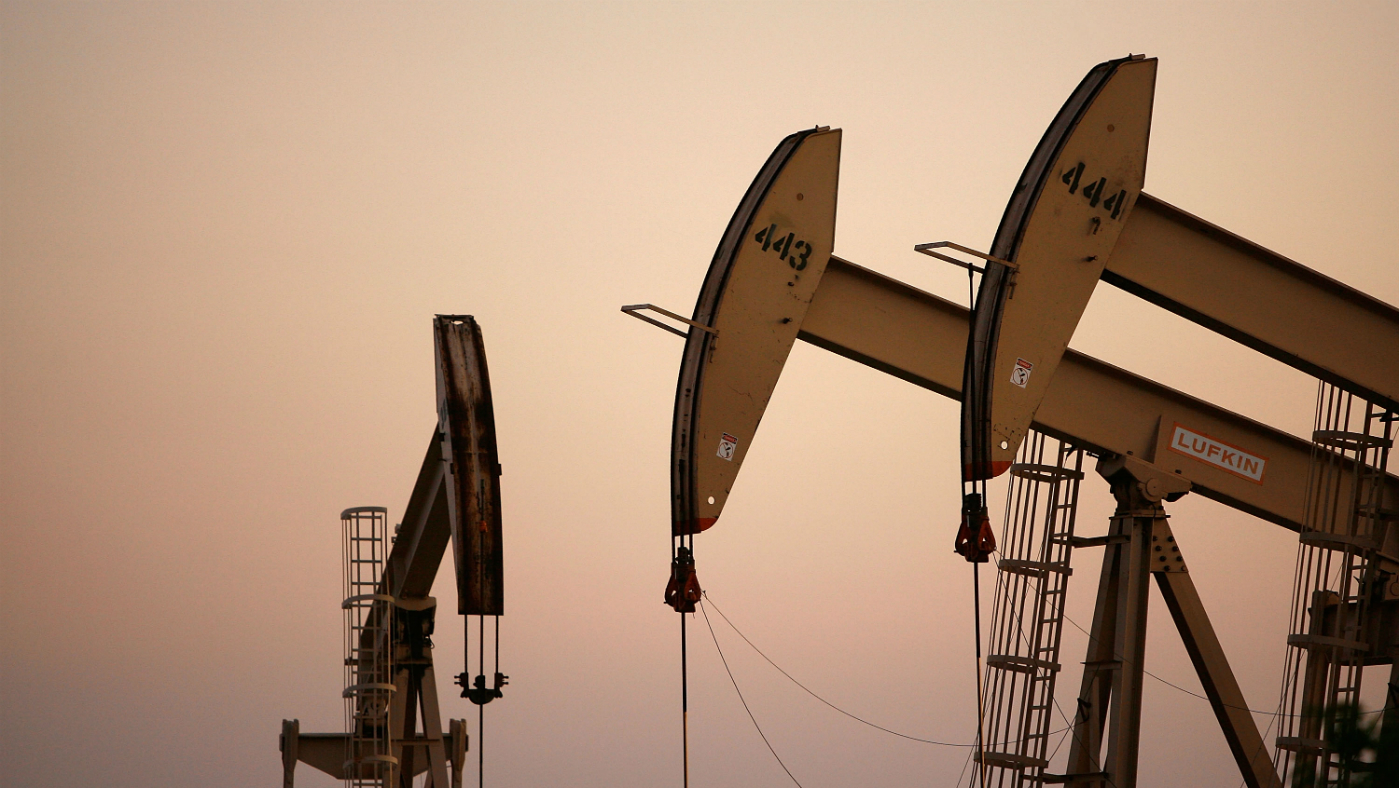Oil price posts two-year highs - but how long can it last?
Brent rose above $59 a barrel this week, its best third-quarter showing since 2004

A free daily email with the biggest news stories of the day – and the best features from TheWeek.com
You are now subscribed
Your newsletter sign-up was successful
Oil price: BP warns cost is critical to energy shift
03 November
A shift from oil and other fossil fuels to renewable energy will only happen if world leaders agree on a carbon price floor "considerably" higher than has so far been discussed, BP has warned.
In its first ever technology report, the oil giant says that accessible reserves of oil and gas are far higher than previously thought due to advances in extraction capabilities. In fact, already proved reserves could increase to 4.8 trillion barrels of oil by 2050, almost double the 2.5 trillion barrels needed to meet global energy needs, The Daily Telegraph reports.
The Week
Escape your echo chamber. Get the facts behind the news, plus analysis from multiple perspectives.

Sign up for The Week's Free Newsletters
From our morning news briefing to a weekly Good News Newsletter, get the best of The Week delivered directly to your inbox.
From our morning news briefing to a weekly Good News Newsletter, get the best of The Week delivered directly to your inbox.
With further exploration and the development of new reserves, the figure could rise threefold to 7.5 trillion barrels.
This means pressure to shift production to less carbon-intensive fuels and ultimately to renewable energy will not come from a shortage of supply. Given the prolonged slump in the oil price over the past year – from a high of around $115 last summer to less than $50 a barrel now – the market appears unlikely to provide its own economic solution.
Instead, BP says policymakers will have to intervene to make the economic case for oil and coal alternatives by setting a high floor price for climate-change causing carbon.
The oil giant says, for example, that at a carbon price of $40 per tonne gas would become more economical than coal in North America, while at $80 a tonne onshore wind would become equally competitive. "You need to have a price on carbon considerably higher… to stabilise [the global temperature rise] at 2 degrees centigrade," says BP technology chief David Eyton in the Wall Street Journal.
A free daily email with the biggest news stories of the day – and the best features from TheWeek.com
This two degree cap is the main goal of the climate change talks taking place in Paris next month. After a string of big companies signed a pledge with the American government – and even oil companies vowed to take action on their own emissions – hopes are high that a far-reaching deal will finally be reached.
Underlining BP's argument, the oil price dropped again yesterday. According to CNBC, falling prices for refined products and data showing record production in Russia during a period of existing oversupply have put pressure on crude oil and left international benchmark Brent back below $49 a barrel.
Oil price: Shell target BG also posts losses
30 October
A second big oil company has reported a net loss for the third quarter, as the impact of the low oil price continues to bite.
Reading-based BG Group revealed today that underlying profits fell nearly 40 per cent for the three months to September compared to last year, from more than $2bn (£1.3bn) to around $1.2bn, the Financial Times notes.
Actual net earnings were $280m, the Daily Telegraph adds, down more than 60 per cent from last year's $759m but better than some analysts had feared.
When the impact of write-downs against reserves following project cancellations, asset sales and currency movements are taken into account, the company actually made a loss of £101m.
This follows the £4bn loss reported earlier this week by Shell, which is awaiting clearance on a £39bn takeover of BG.
BG Group saw a smaller profit drop in its exploration division than some of its peers, however, with a massive increase in output offsetting the decline in the oil price and leaving income down just nine per cent.
Even so, with prices set to remain low for the foreseeable future, the company's chief executive Helge Lund announced that capital spending would be 30 per cent lower overall for this year – and would fall again "meaningfully" next year.
International benchmark Brent crude is rooted below $50 a barrel currently and fell below $48.50 on Thursday.
This is down from around $115 at its peak last summer and is putting pressure on producers, who in some areas are producing oil at a loss and relying on other revenue streams such as trading and refinery operations.
With demand currently on the wane amid an apparent global economic slowdown and with exports from Iran likely to ramp up in 2016, experts are lowering predictions for prices next year.
"Brent crude prices will average $58 a barrel," according to a poll of 13 investment banks polled by the Wall Street Journal. "Many of the same banks were predicting $70 a barrel in 2016 just a few months ago."
Oil price impact leaves Shell with $7.4bn loss
29 October
Shell, one of the biggest of the oil majors, has capped off a week in which the impact of persistently low oil prices has been laid bare by revealing it slumped to a massive $7.4bn (£4.9bn) loss in the third quarter.
The big profit deficit is mainly the result of one-off charges and write-downs in the value of reserves, as the company scales back project spending to protect investor dividends.
The Daily Telegraph notes a decision to stop drilling in Alaska last month has cost $2.6bn, while Shell yesterday confirmed it was calling off a project in Canada at a cost of $2bn.
Overall, the hit from cancelled developments, "alongside charges for redundancies and restructuring", meant that its Upstream division (exploration and production) lost $8.2bn.
Underlying profits fell 70 per cent from $5.9bn last year to $1.8bn, as revenues plummeted 36 per cent to $68.7bn.
Like all majors, Shell is cutting back costs to protect investor payouts – and it confirmed it would maintain the 47 cents-a-share quarterly dividend. Investors seemed to take heart - and perhaps acknowledge things could even have been worse - as shares fell by only a modest one per cent in early trading.
The news comes after rival BP reported a 40 per cent drop in profit earlier this week, followed by Norway's Statoil which posted a 46 per cent fall.
Both also confirmed they would be slashing investment costs to adjust to an era in which oil prices are expected to remain lower for longer. BP is preparing for Brent crude to remain below $60 a barrel until the end of 2017.
The international benchmark is currently below $50, where it has been for most of the summer.
It rose strongly from a recent low around $46.50 to $49 yesterday after the US energy watchdog revealed a slightly lower than expected build in reserves, but has since softened again and was sitting at around $48.50 in London this morning.
Oil price slump forces more cutbacks at Shell and Statoil
28 October
As earnings season progresses for the major oil companies, evidence of the consequences of the ongoing oil price slump continues to come thick and fast.
After BP yesterday pledged asset sales and investment savings (see below) to cope with a lower-for-longer price, Shell today revealed it is abandoning a project in which it has already heavily invested in the Canadian oil sands.
It will take a $2bn write down in the value of the Carmon Creek project, the Financial Times notes, and reduce its reserves estimate by 418 million barrels.
The move is significant because Shell had already "made considerable progress with Carmon Creek", including clearing the site, buying major equipment, building accommodation for workers and beginning drilling on two wells.
But with the oil price looking set to remain low, Shell says "taking the $2bn hit [is] a better option than continuing to invest".
Its announcement comes on the day Norwegian major Statoil also announced its latest round of cost cutting, as it reported worse-than-expected earnings for the third quarter.
Reuters reports operating profit fell to NOK 16.7bn (£1.3bn), down 46 per cent on a year ago and significantly less even than analysts had feared.
As a result, it is cutting project spending by a further $1bn (£650m) to $16.5bn. Back when oil prices were over $100 a barrel last year it was planning to spend $20bn.
The cutbacks are a direct result of the lower oil price. MarketWatch cites comments last year from Lorraine Mitchelmore, the president of Shell Canada, who said it needed prices at $70 a barrel to meet "internal yardsticks for profitability" in the region.
International benchmark Brent crude is currently well below $50 a barrel, where it has been all summer – and it hasn't hit $70 this year.
According to Capital Economics, the oil price may only recover to $55 this year and then struggle to gain much traction through to 2017 when it predicts global oversupply will finally begin to reverse.
Oil price: BP braces itself for $60 per barrel oil until 2017
27 October
The oil major BP has revealed it is planning for a low oil price of no higher than $60 a barrel for at least two more years after it posted third-quarter profits that are markedly down on last year.
The British energy giant has announced an underlying profit of $1.8bn (£1.2bn) for the three months to September, down 40 per cent on the same period a year ago. In response to this nosedive in profits, it has said it will cut billions from exploration investment over the next two years, with its spending falling from $19bn to as low as $17bn in 2016 and 2017. This is a significant drop: at one time projected spend was as high as $25bn.
BP says this will help the company to protect its "rock solid" dividends to shareholders, the Financial Times notes. Investors appear to have taken heart from the news, with shares rising 1.5 per cent initially and still trading positively late this morning. The positive sentiment is helped by the fact that results are better than the 60 per cent fall that some analysts predicted.
As a result of slashing its costs, BP says it will be able to cover investor payouts from cash flow if oil prices remain at $60 a barrel until the end of 2017. Many forecasters have predicted prices will stay this low until at least the end of next year as the market struggles to rebalance its current global oversupply.
Oil prices are currently languishing. International benchmark Brent crude fell below $47.50 on Monday to around $47 overnight, as data showed stockpiles of refined products in the US and Europe hitting capacity. "Unwanted diesel and jet fuel cargoes [are] backing up outside Europe's ports and taking longer, slower routes around the southern tip of Africa," Reuters reports.
The BBC's Kamal Ahmed says low oil prices can also benefit integrated oil majors like BP. The oil giant's results show that exploration profits have fallen sharply from $3.9bn to just $800m, while 'downstream' operations that turn crude oil into refined products are enjoying higher margins with a growth in profits from $1.5bn to $2.3bn. Trading profits are also higher.
While BP is not replacing all of its lost profit through these activities, they are certainly helping it to weather the storm.
-
 Samurai: a ‘blockbuster’ display of Japanese heritage
Samurai: a ‘blockbuster’ display of Japanese heritageThe Week Recommends British Museum show offers a ‘scintillating journey’ through ‘a world of gore, power and artistic beauty’
-
 BMW iX3: a ‘revolution’ for the German car brand
BMW iX3: a ‘revolution’ for the German car brandThe Week Recommends The electric SUV promises a ‘great balance between ride comfort and driving fun’
-
 Munich Security Conference: a showdown between Europe and Trump?
Munich Security Conference: a showdown between Europe and Trump?Today’s Big Question Report suggests European leaders believe they can no longer rely on the US for military support – but decoupling is easier said than done
-
 How might the Israel-Hamas war affect the global economy?
How might the Israel-Hamas war affect the global economy?Today's Big Question Regional escalation could send oil prices and inflation sky-high, sparking a worldwide recession
-
 Recent mega-mergers could signal a turning point for the US oil industry
Recent mega-mergers could signal a turning point for the US oil industryTalking Point Both Chevron and Exxon have recently spent billions to acquire smaller oil companies
-
 Has Saudi Arabia lost control of oil prices?
Has Saudi Arabia lost control of oil prices?Today's Big Question Kingdom goes it alone to cut production, risking tension with US and reigniting cooling inflation in Europe
-
 US angered by Opec+ oil cut
US angered by Opec+ oil cutSpeed Read Energy prices to rise further as producers slash supply by two million barrels a day
-
 Global oil demand forecast lowered for 2020 and 2021
Global oil demand forecast lowered for 2020 and 2021Speed Read IEA report says jet fuel demand remains the major source of weakness
-
 Are US-Iran tensions flaring again?
Are US-Iran tensions flaring again?In Depth Trump threatens military action over Twitter
-
 Can a deal be struck to raise oil prices?
Can a deal be struck to raise oil prices?In Depth Opec+ will convene today over video link in a bid to boost crude
-
 What do negative oil prices mean?
What do negative oil prices mean?In Depth Perfect storm of oversupply and storage shortages sees producers paying to get rid of US crude